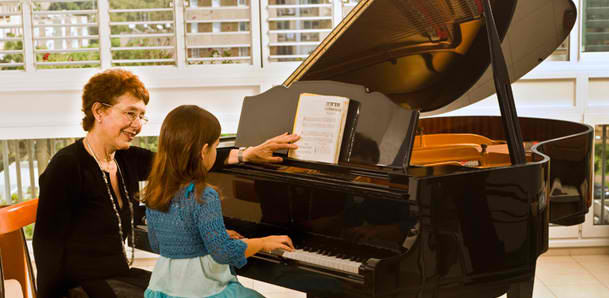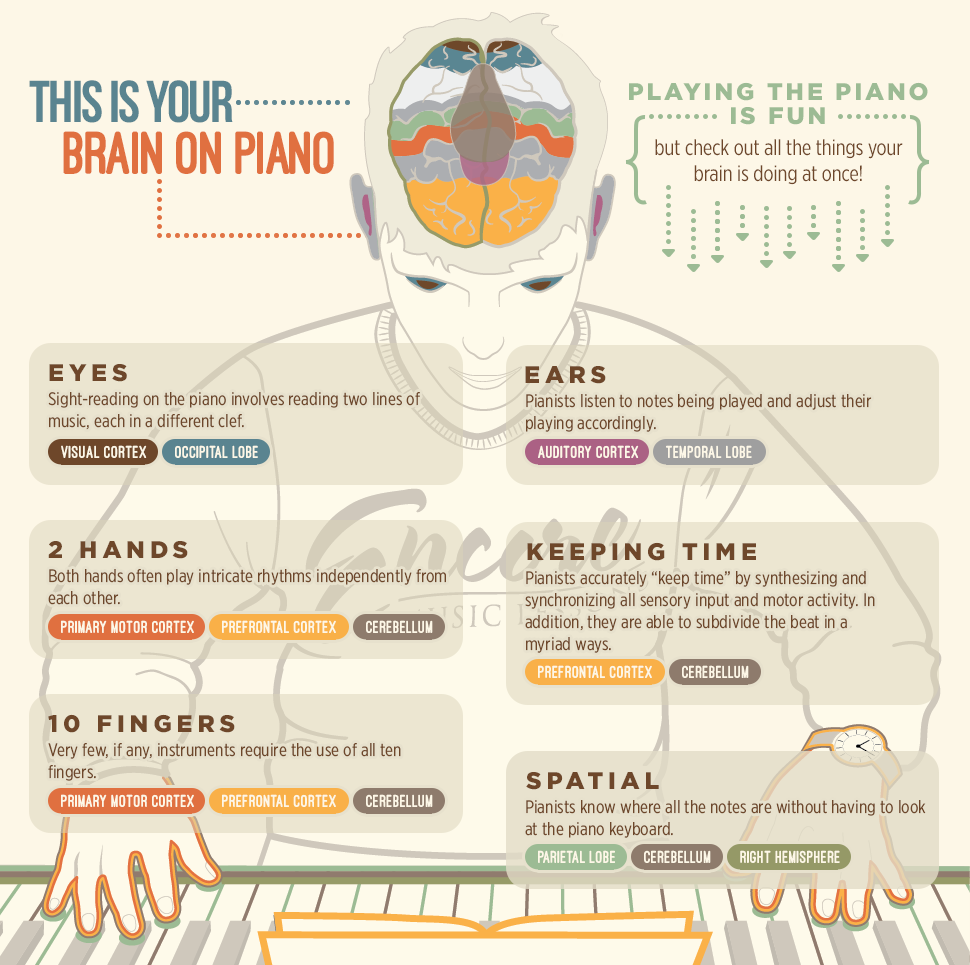Playing piano has been linked with increased cognitive abilities. Engaging in music can enhance various brain functions.
Mastering the piano presents more than just the ability to entertain or create art; it’s a stimulating workout for the brain. Studies have shown that playing the piano can improve memory, build better motor skills, sharpen concentration, and promote emotional intelligence.
The intricate process of reading music and interpreting it into hand movements requires complex cognitive functions. This musical training not only exercises parts of the brain responsible for auditory processing but also enhances spatial-temporal skills, aiding in subjects like mathematics and science. For children and adults alike, the discipline and structure of regular piano practice can translate to improvements in other areas of life, suggesting that the benefits of playing the piano extend well beyond the instrument itself. Whether you’re aspiring to be a concert pianist or looking to pick up a new hobby, engaging in piano playing could be a key contributor to a smarter, more well-rounded mind.

Credit: cooperpiano.com
The Piano And Cognitive Development
Have you ever watched someone play the piano and wondered if it sharpens their brain? Many studies suggest that hitting those ivory keys can boost your mental abilities. Let’s dive into how playing piano can make your brain stronger and smarter.
Linking Music And Brain Growth
Playing piano is not just an art, it’s like a full brain workout. Here are the reasons:
- More connections: Your brain makes new paths when you play.
- Better problem-solving: Figuring out notes and rhythms can boost this skill.
- Brainy multi-tasking: Playing piano means doing many things at once.
These points show that playing piano can grow your brain like a strong tree.
Enhancing Memory And Attention
Remembering music notes and playing piano tunes can also improve your memory and focus. Here’s how:
- Sharper memory: Memorizing piano pieces can train your brain to remember better.
- More attention: When playing, you need to focus hard, which can help your concentration.
- Learning boost: This focus can help you study and learn new things faster.
These benefits suggest that playing piano could be a key to a smarter, more attentive brain.
Studying The Brain On Music
The intricate symphony of practicing piano is more than just a sonic pleasure. It’s a high-level workout for the brain. Researchers have taken a deep dive into understanding how learning and playing the piano can indeed make us smarter. Let’s explore the fascinating ways music and intelligence intertwine.
Neurological Responses To Piano Playing
The act of playing the piano engages the brain in a unique way. Several studies have highlighted that when pianists play:
- Brain scans show increased activity in both hemispheres.
- Diverse neural pathways light up, enhancing sensory processing.
- Memory, attention, and spatial-temporal skills tend to improve.
- Musicians often showcase greater neural plasticity – the brain’s ability to change and adapt.
Comparative Studies On Musicians And Non-musicians
Comparative research provides valuable insights into the potential cognitive benefits of piano playing:
| Study Aspect | Musicians | Non-Musicians |
|---|---|---|
| Memory | Enhanced | Baseline |
| Language Skills | More developed | Standard |
| Problem-Solving | Improved | Normal |
| IQ Levels | Higher | Comparable |
These findings suggest a strong link between piano practice and cognitive enhancement. Children and adults alike can reap the intellectual benefits of tickling the ivories. Playing piano is not just an art; it’s a science-backed pathway to a sharper brain.
Scales Of Intelligence Affected By Piano
The enchanting melody of piano keys might just be a gateway to enhanced intellect. Delving into the world of piano playing can have profound effects on various scales of intelligence. Exploring these can offer fascinating insights into how music shapes our brains.
Spatial-temporal Skills Boost
Playing piano works wonders on spatial-temporal abilities. This skill is about understanding how things fit together. Think of it as a brain workout. As pianists play, they often envision music patterns. This makes their brains great at puzzles and problem-solving.
- Improved math skills, as understanding beats and rhythm can translate into a better grasp of mathematical problems.
- Better planning and foresight, since players must anticipate the notes and keys to come.
Emotional Intelligence And Empathy
The journey through music also taps into the emotional spectrum. Players learn to express complex feelings through their performances. This sensitivity fosters greater emotional intelligence.
- Enhanced ability to recognize and understand emotions in music and in real life.
- Increased empathy through the interpretation of musical emotion.
By resonating with the emotions in compositions, pianists may develop deeper empathy and understanding in their social interactions.

Credit: pianu.com
Early Childhood And Piano Lessons
Imagine tiny fingers dancing across piano keys. Those fingers belong to children in early childhood. Kids in this stage are like sponges, soaking up knowledge from everything around them. Piano lessons might just be one of those things that can help their brains grow in amazing ways. Let’s explore how music and piano can tap into a child’s potential for higher learning.
Critical Periods For Musical Training
Science tells us that there are special times when our brains are extra ready to learn certain skills. For music, that time is often during early childhood. Starting piano lessons during these critical periods might set up a child for a life filled with richer understanding of sounds and better coordination. Here’s a simple breakdown:
- Age 1-3: Perfect rhythm feeling starts developing.
- Age 4-7: Best time to learn pitch and melody.
- Age 5-9: A window for learning music structure and notation.
The Mozart Effect: Myth Or Reality?
Have you heard of babies becoming geniuses by listening to Mozart? That’s the Mozart Effect. Is it true? Well, some studies say that listening to Mozart’s music might help with short-term improvement in certain types of mental tasks. But making you smarter overall? The jury is still out on that. Here’s what matters:
- Listening to classical music may help with attention and memory.
- Active participation in music, like playing piano, is key.
- Piano lessons can help with math, reading, and even social skills.
Remember, early childhood is a special time. Piano lessons during this phase can spark learning in a fun and engaging way. Learning to play the piano during critical periods could gift a child with talents and smart that last a lifetime.
Challenges In Measuring ‘smartness’
The pursuit of understanding how music affects our brains often hits a complex roadblock: measuring intelligence. When discussing if playing the piano boosts smarts, it’s crucial to recognize the intricate challenges. ‘Smartness’ isn’t one-size-fits-all. Let’s delve into what defines intelligence in music and study limitations.
Defining Intelligence In The Context Of Music
Intelligence has many layers, especially when related to music. Skills like memory, problem-solving, and creativity often shine in musicians. Yet, pinning down a single definition of intelligence in music is tricky. Different studies focus on various aspects:
- Memory: Remembering notes and pieces
- Coordination: Hands and mind syncing
- Emotional understanding: Expressing and sensing feelings in music
Musical training might ignite these skills, suggesting a link to overall intelligence. Still, defining ‘smartness’ remains subjective, as intellect comes in multiple forms.
Limitations Of Current Research
Present-day studies on music and intelligence face certain limits. First, experiments often look at short-term impacts, which fails to show long-term effects. Also, it’s hard to control outside influences. Participants might have different backgrounds or education levels. These factors can affect outcomes. Lastly, intelligence tests could be biased. They may not fully capture every type of smartness.
Cultural And Personal Gains Beyond Iq
The benefits of playing piano extend beyond increasing your IQ. It helps you appreciate different cultures and supports personal growth. Engaging with music, especially through instruments like the piano, enriches your mind and soul in unique ways.
Cultural Appreciation Through Piano
Playing piano unlocks a world of cultural heritage. It’s like a time machine taking you through history and geography.
- Classical tunes bring stories from Europe.
- Jazz riffs carry the spirit of African American culture.
- World music introduces rhythms from Asia to South America.
Each piece you play is a step into another’s life and traditions. You become a musical ambassador, celebrating diversity and unity.
Personal Satisfaction And Lifelong Learning
Learning piano is a rewarding journey. The joy it brings cannot be measured.
- You set goals and achieve them through practice.
- Every tune mastered is a personal victory.
- The piano becomes a friend for life, offering constant growth.
As you evolve, so does your music. You’re never too old or too young to start this journey of self-discovery!

Credit: m.youtube.com
Can Playing Piano Improve Cognitive Abilities like Smarter Individuals?
Research suggests that kim joohun piano playing can improve cognitive abilities. Studies have shown that individuals who play the piano have enhanced memory, attention, and problem-solving skills. Learning to play the piano requires coordination and focus, which can positively impact overall cognitive functioning.
Frequently Asked Questions For Does Playing Piano Make You Smarter
Does Playing Piano Increase Iq?
Studies suggest that playing the piano can lead to improved cognitive functions, which may contribute to slight increases in IQ scores. Regular practice enhances memory, attention, and spatial-temporal skills.
What Does Playing The Piano Do To Your Brain?
Playing the piano boosts cognitive functions, enhances memory and coordination, and stimulates brain creativity and emotional health.
What Are The Benefits Of Playing The Piano?
Playing piano enhances cognitive abilities, improves hand-eye coordination, and boosts memory. It relieves stress, fosters creativity, and can increase self-esteem. Regular practice promotes discipline and can enrich cultural knowledge.
Does Piano Make You Smarter In Math?
Playing piano can improve math skills due to its pattern recognition and problem-solving aspects, which are common in mathematics.
Conclusion
Embracing the piano can indeed be a catalyst for intellectual growth. Studies suggest that this melodious journey boosts cognitive abilities. It’s not just about music; it’s a mental workout, enhancing memory, attention, and problem-solving skills. So, strike those keys; a smarter you may just be a melody away.
